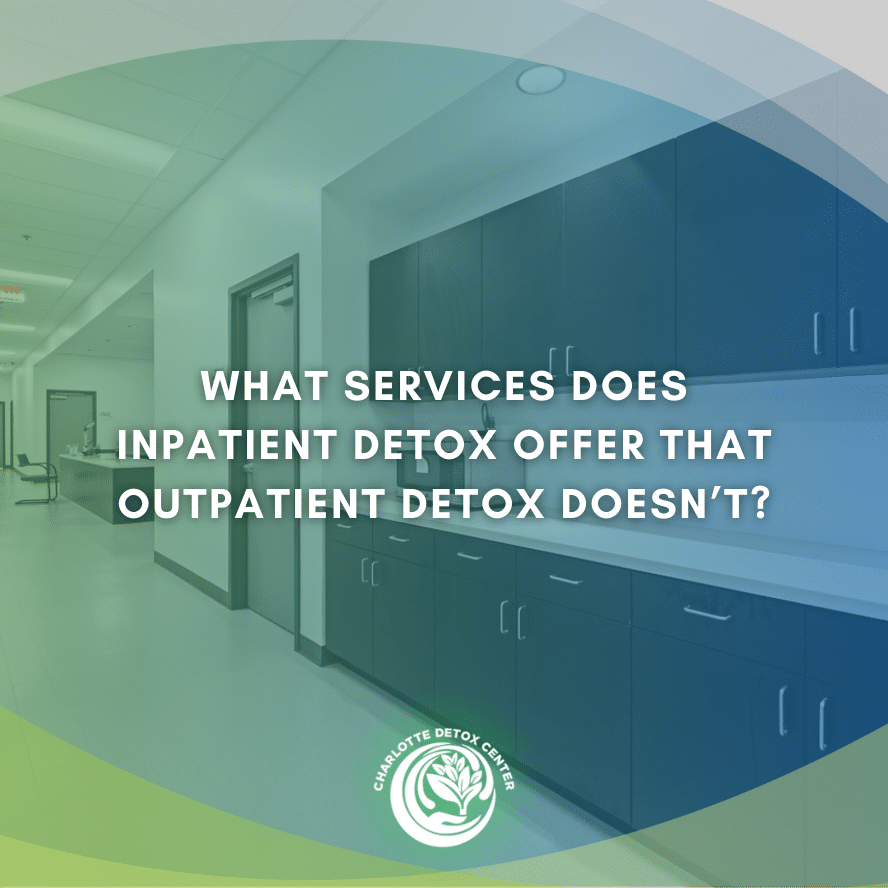What Services Does Inpatient Detox Offer That Outpatient Detox Doesn’t?

Medically Verified: 2/1/24
Medical Reviewer
Chief Editor

All of the information on this page has been reviewed and verified by a certified addiction professional.
Detox is the first step of any addiction treatment program. This is when you stop using substances and allow your body to rid itself of traces of addictive substances and other harmful toxins. Although detoxification is an entirely natural process, detox can be uncomfortable and painful.
You see, when you stop taking drugs or alcohol after becoming addicted, your body has to adjust to not having the substance in your system. This adjustment period is marked by unpleasant withdrawal symptoms that can range from mild discomfort to fever or life-threatening seizures. The best way to manage these symptoms and keep yourself safe is to detox at a medical detox facility.
When choosing a medical detox center in Charlotte, North Carolina, you may be presented with two types of detox programs: inpatient and outpatient. It’s important to understand the differences between these two types of programs so you can make an educated decision as to which one is best for you.
Inpatient vs. Outpatient Detox
Inpatient detox centers are facilities that house patients while they are detoxing from drugs and alcohol. They offer around-the-clock monitoring and medical care to prevent complications and adverse events. These programs not only offer medications and monitoring, but they also have group therapy sessions, support groups, and other sober activities to help you stay busy and pass the time.
Outpatient detox programs, sometimes referred to as ambulatory detox, are programs that provide medication management services to people who are detoxing from drugs and alcohol. If you enroll in outpatient detox, you do not have to stay at the treatment facility. You are able to go home and tend to your daily responsibilities like you usually would. However, unlike inpatient, outpatient detox does not provide around-the-clock care and monitoring. Many do not offer on-site therapy sessions or support groups, either.
How Does Outpatient Detox Work?
Outpatient detox programs do not offer as many services as inpatient programs do. When you are part of an outpatient program, you only go to the treatment facility for your scheduled appointment.
Your appointment will likely be early in the morning and will usually consist of a brief visit with your doctor and the administration of medication. A nurse will give you your medication each day and make sure that you take it. The nurse may also check your vitals and ask about your symptoms before letting you leave until the next day.
Outpatient detox programs are meant to help you detox using prescription medications at an affordable cost without substantial interruption in your everyday life. The problem is outpatient care is not sufficient for all individuals. People who struggle with severe substance use disorder, are addicted to substances that cause life-threatening withdrawal symptoms, or are at a high risk for relapse should detox in an inpatient program.
Benefits of an Inpatient Detox Program
Because inpatient programs offer a wide range of detox services and amenities, they can be more costly than outpatient programs. However, they can also be more effective. A few benefits of detoxing in a residential program include:
- Having access to 24/7 care and support
- Medical monitoring to prevent complications or medical emergencies
- On-site medication administration and supervision
- Having access to a variety of support services like therapy and other activities
- Being surrounded by other like-minded individuals who are also working towards sobriety
How to Know Whether Inpatient or Outpatient Detox is Right for You
When deciding whether an inpatient or outpatient detox program is right for you, you must consider your personal treatment needs. You should absolutely attend a residential program if you:
- Are addicted to benzodiazepines or alcohol since they can cause life-threatening withdrawal symptoms
- Struggle with a mental health condition like depression or anxiety that increases your risk of relapse
- Have a history of relapsing while enrolled in outpatient treatment programs
- Do not have a safe, sober, and supportive home environment to go to
- Do not have an adequate support system
- Are diagnosed with a severe substance use disorder
- Have any medical condition that could put you in danger during withdrawal
On the other hand, you may be a good candidate for an outpatient detox program if you:
- Have a strong sober support system that is willing to support you
- Have a supportive and stable home to stay at
- Are motivated and willing to get sober
- Are able to travel to the treatment facility each day for your appointment
- Do not have a health condition that puts you in danger during withdrawal
- Are cleared by a medical professional to detox on an outpatient basis
Ultimately, the best way to find out which program is right for you is to consult with a trusted addiction specialist. He or she can evaluate your needs and refer you to the best detox center for you.
Find a Drug and Alcohol Detox Center in Charlotte, NC Today
If you or a loved one are struggling with addiction, know that you are not alone. Here at Charlotte Detox Center, there is a whole team of addiction specialists and individuals in recovery who are eager to support you in your recovery journey. Don’t wait any longer. Call now to speak with an addiction specialist and get matched with the right treatment program for you.
